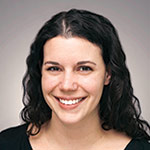From the Editors
Looking Beyond a Billboard
Over the last few months I’ve passed a billboard on my way to the office. “Don’t Buy Our Kids!” it reads, in big letters, accompanied by a photo of a pale child’s hand pushing up against a rain-covered car window. A scared-looking girl’s face is visible, her blue eyes blurred through the glass.
It’s part of a campaign designed to raise awareness about child sex trafficking. It’s serious — and it’s eye-catching. At the same time, I find that its message lets me drive by too easily.
“That’s right, I don’t buy kids,” I’m apt to think. “I’m a good person! This doesn’t apply to me.”
But recent news reports reinforce the complexity of human trafficking. One story highlights a clothing brand known for ethical labor and environmental standards — and shows an internal audit found human trafficking in their supply chain, despite their best efforts. Another article documents trafficking-like labor abuses in New York City nail salons. And yet another report, from the National Human Trafficking Resource Center, documents traumatic experiences that sex-trafficking survivors in the U.S. say put them at risk, including homelessness, domestic violence, poverty, child abuse, and more.
Human trafficking, also called modern slavery, is not an isolated crime. Instead, it is enmeshed both with our own economic systems and with other forms of sin, injustice, and suffering. We can’t just look away.
To me, this says something about what a Christian university can add to the conversation about a serious social problem. With “the tools of rigorous learning,” as SPU’s signature commitments put it, we can engage these issues in their complexity, without neglecting their moral and spiritual dimensions. The Seattle Pacific University alumni, faculty, staff, and students who take an interest in fighting human trafficking and modern slavery think deeply about the question, “What can I do to stop this?”
For instance, I recently met two nurses, Elena Raney ’14 and Grace Lane ’14. Before graduation from SPU, they used their community health practicum course to work with anti-trafficking organization Seattle Against Slavery.
They learned that trafficked people in the U.S. are likely to interact with the health care system, so Elena and Grace created a presentation to inform health care providers about the signs that a patient might be trafficked. They also offered suggestions about how to help in ways that don’t cause further harm to victims. Elena and Grace returned to SPU’s campus this spring to present their material to current pre-health and nursing students.
In this issue of Response you’ll meet more people using their Seattle Pacific education to make an impact in this field. They include members of the Free Methodist Church’s Set Free Movement, headed up by Kevin Austin ’84, who says he is a “missionary to a problem, not a place.”
“Modern abolitionists” such as Kevin take inspiration from the anti-slavery movements of earlier centuries, a vibrant part of SPU’s Wesleyan and Free Methodist heritage. But more than that, they take inspiration from a faith that looks even deeper, to see the image of God in each human being, an image that flourishes when people are free.
 Hannah Notess
Hannah Notess
